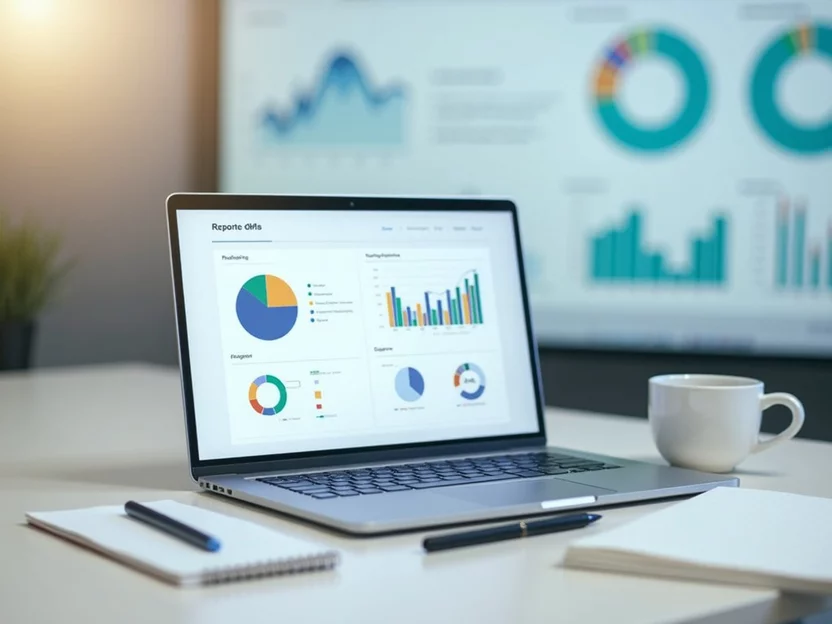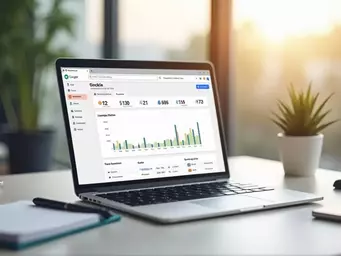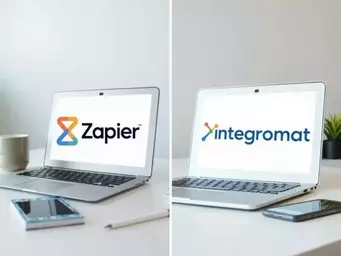Nov 07
Streamlining Reporting for Digital Agencies
In an age where efficiency is key, digital agencies must adapt to thrive. Did you know that automating reporting can transform not only your workflow but also the way you engage with clients? As we explore the significance of automation in reporting, you'll discover how embracing this change can position your agency for sustainable growth.
What You Will Learn
- Manual reporting consumes valuable time that can be redirected towards client strategy and relationship building.
- Human errors in manual reporting can lead to inaccuracies, which damage client trust.
- Automation enhances efficiency by streamlining workflows, allowing quick report generation.
- Real-time data access facilitates informed decision-making and agility in strategy adjustments.
- Customizable dashboards empower agencies to showcase metrics that matter most to clients.
- Choosing the right reporting tools involves understanding your agency's core needs and ensuring scalability.
- Engaging with free trials of reporting tools allows agencies to assess fit without financial commitment.
- Fostering continuous learning within your agency enhances internal processes and client insights.
The Dual Impact of Manual Reporting in Digital Agencies
This visual highlights the core challenges and transformative benefits associated with automating reporting processes in digital agencies. For a deeper dive into enhancing agency operations, consider exploring how to streamline your agency's workflow systems.
Challenges of Manual Reporting
Resource Drain: Time Consumption
Manual tasks divert valuable time from client strategy and relationship building.
Trust Risk: Inaccuracy
Human errors can lead to misreporting, potentially damaging client trust.
Tracking Difficulty: Inconsistency
Variations in data collection hinder consistent progress tracking.
Surface-Level Data: Limited Insights
Manual reports often lack the depth needed for actionable strategic insights.
Benefits of Automated Reporting
Speed & Streamlining: Enhanced Efficiency
Automated workflows generate reports faster, freeing up resources for strategy.
Reliability & Trust: Accuracy & Consistency
Consistent data collection and elimination of human error build client confidence.
Proactive Decisions: Real-Time Insights
Immediate access to KPIs enables agile strategy adjustments.
Client-Centric: Customizable Dashboards
Tailor reports to highlight metrics most valuable to each client's goals.
Understanding the Need for Automating Reporting in Digital Agencies
In the fast-paced world of digital agencies, efficient reporting can often feel like an uphill battle. Many agencies still rely on manual processes that are not only time-consuming but also prone to errors. When reporting is done manually, it can drain valuable resources, leaving little time for strategic growth. That's where automation steps in!
Before we dive into the nitty-gritty of automating reports, let’s take a moment to appreciate the key challenges agencies face with manual reporting. From inconsistent data collection to the constant updates that need to be made, these manual processes can quickly become overwhelming. Agencies that don’t adapt risk falling behind, which is something I’ve seen firsthand working with clients at Automate Success.

Challenges Digital Agencies Face with Manual Reporting
- Time Consumption: Manual reporting takes away time that could be spent on client strategy and relationship building.
- Inaccuracy: Human error can lead to misreporting, which can damage client trust.
- Inconsistency: Variations in data collection methods lead to inconsistent results, making it challenging to track progress.
- Limited Insights: Manual reports often lack the depth needed to derive actionable insights.
Recognizing these challenges is the first step toward transformation. Embracing automation allows agencies to cut down on these inefficiencies significantly. It’s not just about saving time; it’s about shifting the focus back to what truly matters: delivering exceptional value and driving growth.
Benefits of Automating Reporting for Agency Efficiency
So, why should agencies consider automating their reporting processes? The advantages are numerous. First and foremost, automation enhances efficiency by streamlining workflows. With the right tools in place, agencies can generate reports in a fraction of the time it takes to do it manually.
Additionally, automated reporting ensures that data is consistent and accurate. This reliability fosters trust with clients, as they can see the results clearly and confidently. Lastly, automated systems allow agencies to focus on strategic initiatives rather than getting bogged down by tedious data entry.
How Reporting Tools Enhance Agency Performance and Metrics Tracking
Implementing automated reporting tools can truly revolutionize how agencies operate. By providing real-time insights, these tools empower teams to make informed decisions quickly. The ability to track key performance indicators (KPIs) in real-time means you can pivot strategies on the fly, ensuring you're always aligned with client goals. Learn more about workflow automation ideas for agencies to further enhance your operational efficiency.
- Real-Time Data Access: Stay updated and proactive with automatic data refreshing.
- Customizable Dashboards: Tailor your reports to highlight the metrics that matter most to your clients.
- Collaboration Features: Share insights easily with team members and clients to foster better communication.
Ultimately, the right reporting tools not only enhance performance but also position agencies as leaders in the digital landscape. By taking advantage of automation, agencies can transition from being mere SEO practitioners to becoming systems-led growth leaders, paving the way for sustainable success.
Pro Tip
To maximize the benefits of automation, consider integrating a centralized dashboard that combines all your key reporting metrics in one place. Tools like Google Data Studio or Tableau can help you create visually appealing, real-time reports that not only save time but also provide deeper insights into client performance. This approach not only enhances transparency but also builds trust with your clients as they see results unfold instantly.
Making the Right Choice for Your Agency
Choosing the right reporting tool for your agency can feel like a daunting task, but it doesn't have to be! At Automate Success, I've seen firsthand how the right tools can transform the way agencies operate. With so many options available, it’s essential to focus on what truly meets your needs and supports your growth.
Here are some key takeaways to consider when selecting the best reporting tool:
- Identify Your Core Needs: Understand what features are most important for your agency and clients.
- Scalability: Ensure the tool can grow alongside your agency as you take on more clients.
- Usability: Choose a platform that is user-friendly for both your team and your clients.
- Integration: Look for tools that easily integrate with your existing systems and workflows.
By focusing on these aspects, you’ll be better equipped to choose a reporting tool that not only meets your current needs but also aligns with your agency's vision for the future!
Next Steps: Free Trials and Evaluating Fit for Your Needs
Once you've narrowed down your options, the next step is to take advantage of free trials. Many reporting tools offer them, allowing you to explore features and functionality without making a financial commitment. During this phase, actively engaging with the software can provide valuable insights into how well it fits with your agency’s processes.

- Test Key Features: Focus on the functionalities that are crucial for your reporting needs.
- Gather Feedback: Involve your team in testing and get their thoughts on usability.
- Assess Support Options: Check the availability of customer support during the trial period.
Taking these steps will help ensure that you select a reporting tool that truly enhances your agency's efficiency and effectiveness!
How to Assess Reporting Workflows for Improved Efficiency
Evaluating your current reporting workflows is a vital part of the selection process. Take a step back and examine how your team currently manages reporting tasks. This will help you pinpoint areas where automation can add significant value. Start by asking yourself:
- What are the most time-consuming aspects of our reporting process?
- How often do we encounter errors in our reports?
- Can we automate any repetitive tasks to save time and resources?
By identifying these pain points, you’ll not only enhance your reporting capabilities but also streamline your overall agency operations.
Embracing the Future of Reporting Automation
The digital landscape is continuously evolving, and staying competitive means keeping up with the latest trends in reporting automation. As someone who is dedicated to equipping agencies with the right tools, I encourage you to always be on the lookout for innovations that can drive your agency forward.
Staying Competitive with Emerging Trends in Reporting
Automation is no longer just a luxury; it’s a necessity for digital agencies aiming to remain competitive. As I work with agencies every day, I’ve noticed a few trends that are shaping the future:
- Real-Time Reporting: Clients expect immediate access to data and insights.
- Customizable Dashboards: Personalization is key to showcasing relevant metrics effectively.
- AI Integration: Artificial intelligence is becoming essential for analyzing data and generating reports.
By embracing these trends, your agency can better meet client expectations and stand out in a crowded marketplace!
Encouraging Continuous Adaptation and Learning in Reporting Methods
In the world of reporting automation, being static is not an option. It's crucial to foster a culture of continuous learning and adaptation within your agency. Make it a point to regularly review your reporting processes, tools, and strategies. Attend webinars, workshops, or training sessions to stay updated on the latest features and methodologies! To learn more about optimizing your processes, explore essential workflow automation tools.
Incorporating a mindset of growth will not only enhance your internal processes but will also empower your clients with cutting-edge insights.
Exploring Predictive Analytics for Future Agency Strategies
As we move towards an increasingly data-driven future, predictive analytics stands out as a game-changer for digital agencies. This approach allows you to anticipate client needs and optimize your strategies accordingly. By analyzing historical data, you can forecast trends and make informed decisions that drive better results! For agencies looking to simplify client onboarding processes, check out our guide on streamlining client onboarding processes.
- Identify Trends: Spot patterns that can inform marketing strategies.
- Enhance Client Retention: Use insights to create more personalized experiences.
- Improve ROI: Utilize data to allocate resources more effectively.
Integrating predictive analytics into your reporting will not only enhance your agency's performance but will also position you as a leader in the automation space!
Recap of Key Points
Here is a quick recap of the important points discussed in the article:
- Challenges of Manual Reporting: Time consumption, inaccuracy, inconsistency, and limited insights can hinder agency performance.
- Benefits of Automation: Enhanced efficiency, improved data accuracy, and the ability to focus on strategic initiatives are key advantages.
- Choosing the Right Tool: Identify core needs, ensure scalability, prioritize usability, and check for integration capabilities.
- Next Steps: Take advantage of free trials and gather team feedback to assess fit and functionality.
- Continuous Improvement: Regularly evaluate reporting workflows and stay updated with emerging trends to maintain a competitive edge.
Frequently Asked Questions About Automating Reporting
Q: Why is automating reporting crucial for digital agencies?
A: Automating reporting is crucial because it saves valuable time, reduces human errors, ensures data consistency, and provides deeper, real-time insights. This allows agencies to focus more on client strategy and relationship building instead of manual data compilation.
Q: What are the main challenges associated with manual reporting?
A: Manual reporting often leads to significant time consumption, inaccuracies due to human error, inconsistencies in data collection, and limited insights that lack the depth for strategic decision-making.
Q: How can automated reporting enhance client trust?
A: Automated reporting enhances client trust by providing consistent, accurate, and reliable data. Real-time access to performance indicators and customizable dashboards ensure transparency, allowing clients to clearly see results and progress.
Q: What factors should an agency consider when choosing a reporting tool?
A: Key factors include identifying your core needs, ensuring the tool offers scalability for future growth, prioritizing user-friendliness for both your team and clients, and checking for seamless integration with existing systems and workflows.
Q: What role does predictive analytics play in future agency strategies?
A: Predictive analytics helps agencies anticipate client needs, forecast trends, and make informed decisions by analyzing historical data. This leads to better marketing strategies, enhanced client retention through personalized experiences, and improved ROI by effectively allocating resources.

Sophie Langley
Automation strategist. Digital consultant. Systems-led growth advocate.
Sophie Langley is dedicated to transforming digital agencies into efficient, systems-driven operations, empowering agency owners to embrace a future of sustainable growth. Join her on our blog for cutting-edge insights and tailored strategies that streamline your workflows and enhance your client success.


